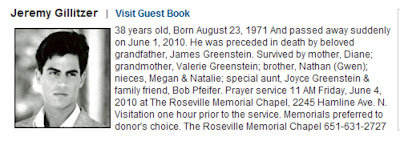JEREMY GILLITZER: A SHADOW OF HIS FORMER SELF [Update: REST IN PEACE, JEREMY]
Yesterday, I learned that Jeremy had suddenly passed away on June 1st, 2010, at the age of 38. According to this article, Jeremy weighed only 66 pounds at the time of his death.
Up until the time of his death, Jeremy had been working at the US Census Bureau, Minneapolis office.
I can't tell you how devastated I was to learn of Jeremy's passing. I got to know him through his emails and he was such a lovely person, dedicated to spreading the word about the deadly effects of eating disorders, even as he continued to struggle with his own. He will be sorely missed by his family, friends, and all of those he touched with his story of his lengthy struggle.
Jeremy, may you finally find the peace that eluded you in life. Shine on.
Up until the time of his death, Jeremy had been working at the US Census Bureau, Minneapolis office.
I can't tell you how devastated I was to learn of Jeremy's passing. I got to know him through his emails and he was such a lovely person, dedicated to spreading the word about the deadly effects of eating disorders, even as he continued to struggle with his own. He will be sorely missed by his family, friends, and all of those he touched with his story of his lengthy struggle.
Jeremy, may you finally find the peace that eluded you in life. Shine on.
ORIGINAL POST:
For Jeremy Gillitzer, his days as a male model must seem light years away.

Jeremy's face and body have morphed from well-chiselled to skeletal. He weighs only 90 pounds (41kgs) and has been anorexic and bulimic for over 25 years. Jeremy will be turning 38 years old in a few days time, on August 24, 2009.
Here is Jeremy's story...
From CityPages.com:
 "Boy, Interrupted
"Boy, InterruptedBy Kevin HoffmanPublished on October 30, 2007
"At first I worried I'd have trouble picking Jeremy out of the crowd—Caribou Coffee was packed—but there was no mistaking him. "Gaunt" isn't the word. He's fragile. Brittle. His skin is stretched so tight over his temples that you can practically see his thoughts.
All the seats were taken, so we carried our coffee next door to Subway. The restaurant was empty, but Jeremy insisted on asking permission to sit down. "We're going to order before we leave," he promised. Although Jeremy's appearance would seem to suggest otherwise, the guy making sandwiches wasn't inclined to argue.
 A
half-hour later, Jeremy approached the counter again and dug his hand
into his pocket, plucking out a tiny, folded-up coupon. It entitled him
to a kids' meal—a third the size of an adult sub. Jeremy got a scoop of
tuna fish on wheat, a small milk, a four-ounce yogurt, and a cookie.
A
half-hour later, Jeremy approached the counter again and dug his hand
into his pocket, plucking out a tiny, folded-up coupon. It entitled him
to a kids' meal—a third the size of an adult sub. Jeremy got a scoop of
tuna fish on wheat, a small milk, a four-ounce yogurt, and a cookie.He took his meal home to his downtown Minneapolis condo, ate it in small bites, then vomited it down the drain.
Jeremy may be an extreme example, but more men than ever are suffering from eating disorders. Earlier this year, Harvard researchers released the results of the first major nationwide mental health survey to include eating disorders. It found that men accounted for 25 percent of anorexia and bulimia cases and a full 40 percent of binge eaters. "These disorders are less common in men, but maybe not quite as rare as we once thought," says Dr. James I. Hudson, the study's lead author.
There's even a tabloid-friendly name for the disorder: manorexia. The neologism was apparently coined by Dennis Quaid, who used it in an interview with Best Life to describe his experience of losing 40 pounds to play Doc Holliday in 1994's Wyatt Earp. "I'd look in the mirror and see a 180-pound guy, even though I was 138 pounds," Quaid said.
 Other celebrities rumored to have suffered from "manorexia" include Ethan Hawke and Billy Bob Thornton (post-Angelina Jolie).
Other celebrities rumored to have suffered from "manorexia" include Ethan Hawke and Billy Bob Thornton (post-Angelina Jolie)."There's a lot of reason to believe that body image concerns are increasing in both women and men," says Dr. Hudson.
Jeremy, who asked that his last name be withheld to protect his privacy, entered the world in St. Paul on August 23, 1971, an event he'd later sum up in four words: "The spawn is born." His biological dad didn't stick around, and his mother, who worked at a department store, married a carpenter, who dutifully adopted Jeremy.
"The relationship with my stepdad was horrible; he treated me like shit," Jeremy says. "He acted like I was an intruder in his home."
Jeremy was a pudgy kid, still carrying his baby fat, and his weight was a frequent target for his stepfather's ire. "He'd always say I was fat, or needed to lose weight," Jeremy says.
If that wasn't enough, Jeremy was going through puberty and confronting the fact that he was gay. The very thought of it horrified him. He could only imagine how his stepdad would react. And what about his grandparents, with whom he played Yahtzee?
Then, when he was 12, Jeremy discovered a solution to both problems: starvation.
 "It
serves two purposes," Jeremy says. "It serves a very applied purpose in
that if you're doing the behaviors, you don't have time to think about
being gay. And also being malnourished, you don't feel sexual, so you
don't have to worry about being gay or straight."
"It
serves two purposes," Jeremy says. "It serves a very applied purpose in
that if you're doing the behaviors, you don't have time to think about
being gay. And also being malnourished, you don't feel sexual, so you
don't have to worry about being gay or straight."Daralyn Sachs, a childhood friend of Jeremy's, remembers him as an emotionally needy boy who was always looking for an excuse to get out of his house. If they had a play date for Saturday morning, he'd be at her house bright and early at 7:00 a.m.
"He'd eat dinner at our house—I'm sure he would sleep over if he could," she says. "He would go from house to house, searching for somewhere to be other than home."
Within months of starting his crash diet, Jeremy was suffering advanced symptoms of starvation. He was sensitive to cold and had grown a fine coat of body hair. He saw a doctor in November 1983 who took one look at the 85-pound boy and diagnosed him with anorexia nervosa.
A month later, after losing nine more pounds, Jeremy entered Children's Hospital of St. Paul. "Jeremy is a 12-year-old boy admitted for evaluation and treatment of anorexia nervosa," reads the December 15, 1983 evaluation. "He is somewhat irritable and is having difficulty concentrating on his schoolwork. He is substantially small for his age."
The doctors employed a carrot-and-stick approach, with mixed success. Jeremy was allowed to eat anything he wanted, but his television, telephone, and visiting privileges would be taken away if he didn't meet goals for gaining back the weight. Jeremy put back on the pounds and was discharged after a month, but within a year of returning home, he was back to his bad habits.
By 14, Jeremy was stealing laxatives from the local pharmacy and taking the round pink pills by the handful. At his worst, he swallowed 30 Correctols at once. "I was throwing up, and turning around and sitting down and going to the bathroom, and throwing up, 'cause I was so sick," Jeremy says. "But sometimes I would lose seven pounds from before-and-after by taking those pills. That's in an hour, and it's all water."

Jeremy learned how to properly purge when he was sent to Station 62—the adult psychiatric ward of the University of Minnesota Hospital. An older patient named Diane had been throwing up so long, she wore dentures though she was only in her late 20s. "She kind of taught me how to do it," Jeremy says. "Taught me to drink a lot of water to get it all up, and to eat certain foods that are easier." Rice, for example, would still be coming up hours after he ate it. "Whereas things that are liquid are obviously easy to throw up—milk, yogurt, what else? Anything that's liquid or meltable. Soup without all the stuff in it."
Jeremy remembers Station 62 as a veritable Tower of London. To ensure he wouldn't puke up his food, he was confined to a geriatric chair for hours after each meal, he says. When he failed to make weight or acted out, he was sent to solitary confinement in the "Quiet Room"—a tiny cell with little more than a bare mattress.
Jeremy took to puking in protest. "People would look at it and they'd be astounded," Jeremy remembers. "But after a while they got used to it and just gave me a rag and disinfectant spray and had me clean it up."
As Jeremy cycled through treatment centers, he devised ever more elaborate ways to hide his vomit from the staff. "I'd do things to get around them, like throw up in big cups and then hide them, both in the day room and in my room. I would throw up in the washing machine and run it through the rinse cycle—I did that once, I shouldn't say I did that regularly. But it's amazing what you'll do."
Eventually, Jeremy's insurance ran out, and in order to continue treatment, he was committed to what was then known as Anoka State Hospital. It was just as restrictive as Station 62, but with a much more volatile clientele. "The first night I was there, a girl who was schizophrenic started her mattress on fire and we were evacuated into a barbed-wire courtyard," Jeremy says. "It's kind of a lot of shit for an 18-year-old to experience."

A psychiatric evaluation prepared around this time reveals the depth of Jeremy's despondence. "During the first few months of hospitalization the patient was obsessed with thoughts of suicide," it reads. "He attempted to choke himself with a towel and again with a belt.... He also states that he has cut his finger tips with razor blades in the past because he felt so numb and needed to know that he could feel something."
After a year at Anoka, Jeremy was discharged, though he wasn't cured, and he moved in with his grandparents. When he grew tired of arranging his binging and purging around their schedule, Jeremy moved into the first apartment of his own.
But try as he might, Jeremy couldn't have a normal life. He hoarded food like a survivalist, his pantries bursting with dozens of boxes of breakfast cereal. When his landlord discovered he was storing food on the patio, Jeremy received a sternly worded letter. "Please don't force me to go to the State Health Department," it said. "You're a nice young man and I don't want this to end in eviction for you."
It couldn't be avoided. Jeremy was kicked out.
Then something amazing happened: Jeremy got better. At 21 years old, he came out of the closet. "It took a couple of years, and it was kind of exploring on my own, and then it was telling a trusted family member, and then another one of them, and then friends, and the next thing you know, you're in drag," Jeremy says with a laugh. Gradually, he stopped binging and purging. The compulsion lifted like a forgotten grudge.
Freed of his symptoms, Jeremy enrolled at the U of M—this time as a student rather than a patient. He pursued his interest in political science, becoming so convinced that he would one day run for office that he had "Jeremy's Campaign for Congress" emblazoned on his checks.

Jeremy in his Calvins in 1997
"It was a wonderful time of my life," Jeremy says.

In 2004, everything fell apart. Jeremy's relationship with his first and only long-term boyfriend ended in a torrent of jealousy and hurt feelings. Then his mother fell seriously ill. Two car accidents within a month pushed him over the edge. Overwhelmed, Jeremy returned to the comfort of his old routine.
"The actual act of purging relieves anxiety—physiologically, it's one of the things it does," Jeremy says.

By January 1, 2007, Jeremy was deep in the throes of his eating disorder. "So far, 2007 has been much like 2006 ended," he wrote on his blog. "I woke up twice during the night and binged and purged. Later this morning, I will be going to circuit training class at 8:30. I might also go to spin class immediately following if I feel up to it."
Jeremy started a blog in the hopes of meeting other males with eating disorders, but he soon fell in with an online sisterhood of anorexics. They offered sympathy and comfort, especially when one of their own succumbed. "I was just reading Feisty Frida's Blog and found out the horrible news that Leah just died from her eating disorder," Jeremy wrote on January 10. "It makes me very angry at this awful disease."
Jeremy wasn't much better off. Just five days later, he found himself short of breath after his spin class, his fingers turning blue even though he wasn't cold. Jeremy called a doctor friend and briefly considered going to the hospital, but drank some juice and felt better. Later that night, he binged and purged.
He was withering away; you'd have to be blind not to see it. Finally, the manager of his gym politely asked him to stop coming until he got healthier. It was a liability issue, she explained.
Though no longer exercising, Jeremy continued to shed pounds. On March 16, he weighed 109. Just a month later, he was down to 102 pounds. "Two more pounds..." he wrote on his blog. "And then what? I'll be happy all of the sudden?"
Two weeks later he hit 99, and he wasn't anywhere near happy.Guess Who?
My hair is falling out and growing on my body...to keep me warm.
My gums are receding.
My reproductive system is dormant...or dead.
I am hunchbacked because my muscles cannot support my neck.
I am extremely constipated.
I have a bedsore on my tailbone from the friction.
An 80-year-old lady, you ask? No, a 35-year-old man.
—Posted on Jeremy's blog on June 15, 2007
If there's one thing Jeremy won't abide, it's questions about whether he's going to enter treatment. As far as he's concerned, that's nobody's business but his own. If you'd experienced what he's been through at hospitals, he says, you'd understand.
Just a few weeks ago, he seemed resigned to death.
"If I'm supposed to be here in a year, I'll be here," he said. "I figure it can't be worse than the amount I've suffered to date, so I'm not afraid of that part of it. The only thing I'm really afraid of is if there was something big I was supposed to do and I wasn't able to do it. That's my only fear."

Since then, his mood seems to have brightened. He is considering getting treatment at Methodist Hospital in St. Louis Park, the best local facility for people with eating disorders. He talks about writing a memoir and offering his services as a public speaker. Maybe that's the "something big" he's supposed to do, he says.
Sachs, now a 37-year-old mother of two young boys, hopes her childhood friend will begin the journey to recovery. "I've never seen him this bad," she says. "To me, you always see him the way he should be, and so now when I look at him, I think it's horrible. When I look at him I want to cry."
On January 9th, 2009, Kevin Hoffman's story on Jeremy, Boy, Interrupted, was picked by Inside Edition in its roundup of notable 2008 stories. Congratulations, Kevin, on your compelling story.
And below...the video, Boy, Interrupted: One Man's Struggle with an Eating Disorder, from CityPagesMN, from November 2007, which has this note:
Jeremy, a 36-year-old suffering from anorexia and bulimia, was profiled in City Pages. In this footage from more than a year ago (2006), we see a healthier Jeremy...
Jeremy, a 36-year-old suffering from anorexia and bulimia, was profiled in City Pages. In this footage from more than a year ago (2006), we see a healthier Jeremy...
For
those of you who have read the story, this footage takes place after
Jeremy started his blog, but before he stopped going to his gym because
of the potential liability issue.
Please take a moment to read Jeremy's blog. He's been to hell and back.
Start here with his first post:Introduction
(((Jeremy)))
~ Medusa
Start here with his first post:Introduction
(((Jeremy)))
~ Medusa
AN UPDATE FROM JEREMY:
"I would like to speak about my eating disorder to schools, companies, and any organizations that will benefit from my suffering. I know this would help me too.
If anyone knows someone that wants me to speak extemporaneously and answer questions, please let me know. Love, Jeremy."
If you would like to contact Jeremy about a speaking engagement, please send him an e-mail at jeremygillitzer@aol.com.
Many thanks.
~ Medusa


This makes me very sad. Is this someone you personally know?
ReplyDeleteno
Delete